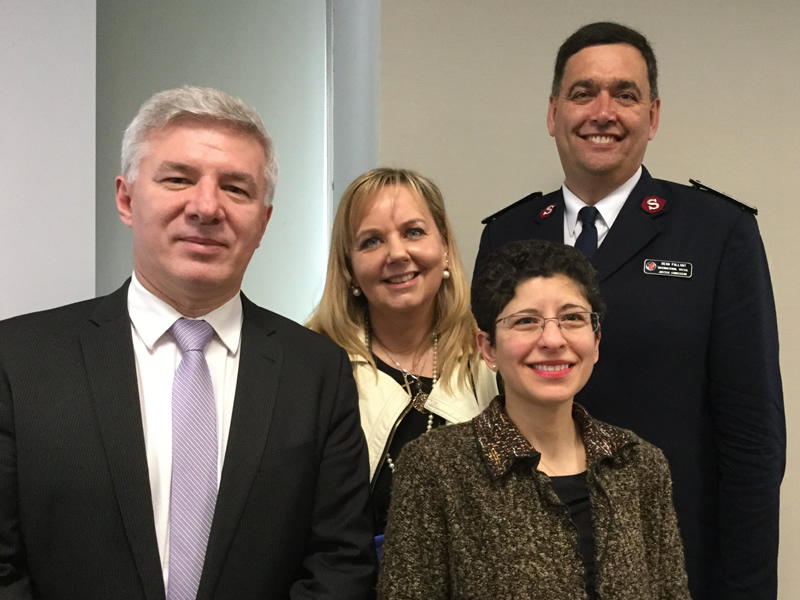NEW YORK — In a world with dizzying religious diversity, taking time to consider ways to enrich communication among religious groups and with the public is important now more than ever before.
Over three days March 31 to April 2, more than 120 communicators from across the religious spectrum gathered in New York City to build “bridges” among faith groups, find “avenues” to new communications skills and discover “intersections” between faith groups at the Religion Communicators Council’s (RCC) annual convention.
To open the conference, the Rev. Dr. James Forbes, minister emeritus of The Riverside Church in New York, urged religion communicators to take God’s love, justice, mercy, and truth that they receive then mix it, write it, video it, print it.” In doing so, each will see the legacy of faith and give it away. “If you do that – give it away – then you’ll be happy,” he said.
In conversations, panel discussions and workshops, the conference provided insight on collaboration around advocacy efforts addressing key issues of social justice, ways religion communicators can help journalists cover the vast religion landscape, digital tools accessible by religion communicators and journalists alike, and many other topics at the intersection of communication and religion.
Panelists in a session on working within and across faith communities to find commonality and bring about change agreed that the lack of civility and increase in hate speech in the current presidential campaign polarizes and divides different religious communities. This, they said, makes their work more difficult, and it underscores the necessity of partnerships across religious groups.
Daniel Sieberg, global head of media outreach with the Google News Lab, revealed new digital tools to improve storytelling, offered a sneak peek at news reporting’s future, and challenged thinking about the relevance and value of virtual reality for communications.
Moderator Dr. Azza Karam, coordinator of the UN interagency task force on religion and development, opened a session on Faith Organizations, the UN and the Sustainable Development by asking: “What’s faith got to do with it? Participating on the panel with her were the Rev. Dr. Karin Achtelstetter, general secretary of the World Association for Christian Communications; Lt. Colonel Dean Pallant, director of the Salvation Army’s International Social Justice Commission; and Rudelmar Bueno de Faria, World Council of Churches representative to the UN and coordinator of the UN ecumenical office in New York.
In their discussion, panelists agreed that religious organizations were involved in sustainable development long before the UN or some governments were capable of doing that. Religious organizations provided what governments could not provide. Lately, however, UN agencies have been pushing religious organizations to become more involved directly in the sustainable development goals of the UN.
A panel, “Election Year and Beyond: Social and Political Activism in the City’s Black Churches,” covered the intersection of religious tradition, activism and social justice in light of the contemporary social issues and political events. Panelists represented a rich range of views and experience with these issues. As moderator, Dr. Frederick Harris, Director of the Center on African-American Politics and Society at Columbia University, posed thought-provoking questions on how African-American churches are responding to a range of issues from the Black Lives Matter (BLM) movement to the upcoming national elections.
As part of the convention each year, RCC recognizes excellence through two award ceremonies, the DeRose-Hinkhouse Memorial Awards and the Wilbur Awards. The DeRose-Hinkhouse Memorial Awards are given annually to active RCC members who demonstrate excellence in religious communications and public relations. The RCC handed out awards in nearly 60 categories of communications and public relations. The awards honor the late Victor DeRose and Paul M. Hinkhouse, who were leading lithographers in New York.
The Wilbur Awards, which recognize excellence in the communication of religious issues, values and themes in secular media, have been presented annually since 1949. Basic criteria include content, creativity, execution and results, but the ultimate criterion is excellence in the communication of religious values. Winners included Oprah, CNN, Vanity Fair, NPR and CBS Sunday Morning.
A special Wilbur Award was given to the Rev. Dr. Joan Brown Campbell, former head of the National Council of Churches and former Director of Religion at the historic Chautauqua Institution. The honor recognized Campbell’s more than 30 years of public and behind-the-scenes work in all forms of media.
 The Religion Communicators Council (RCC), founded in 1929, is an association of communications professionals who work for and with a diverse group of faith-based organizations in the areas of communications, public relations, marketing and development.
The Religion Communicators Council (RCC), founded in 1929, is an association of communications professionals who work for and with a diverse group of faith-based organizations in the areas of communications, public relations, marketing and development.





